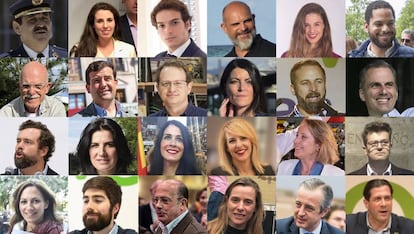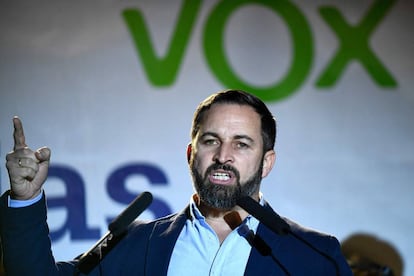Who are the 24 new deputies from the Vox party in Spain’s Congress?
Retired members of the military, disillusioned former Popular Party politicians, an Arabic lecturer and a state solicitor are among the far-right group’s new parliamentarians

Although the far-right party Vox did not perform as well as expected at the general election on Sunday, it won 10.3% of the vote and will enter Spanish Congress for the first time with 24 deputies, nine of whom are women. The new parliamentarians come from a wide range of backgrounds, including retired military members, former members of the conservative Popular Party (PP), and a housewife.
1. Alicante | Manuel Mestre Barea
Lieutenant-General Mestre Barea, 67, has had a long military career, having served in places such as Afghanistan, Kuwait and Bosnia-Herzegovina. In September 2009 he became chief of staff of the NATO Combined Force in Lisbon, where he led Operation Ocean Shield, which targeted piracy in the Horn of Africa. In 2015, he was transferred to the military reserve force.
2. Almería | Rocío de Meer Méndez
De Meer, 29, is a law graduate from Madrid’s Complutense University. She was named as a Vox nominee on the last day for candidate appointments. According to the local newspaper Diario de Sevilla, this mother of two was born in Madrid. She gave up a career to start a family and is currently a housewife. When she was studying law in 2011, De Meer won second prize in the Gabriel Cisneros public-speaking competition, organized by the Denaes Foundation, an organization that was then headed by Vox leader Santiago Abascal. In her speech, De Meer argued that “the real discrimination in this country is against the 100,000 children who are not born each year for measuring only a few millimeters, or for having an illness or a genetic disorder,” in reference to Spain’s abortion laws, which allow for on-demand terminations up to the third month of term.
3. Asturias | José María Figaredo Álvarez-Sala
Figaredo, 30, has a degree in law and business administration and management from the Catholic Higher Learning Institution (ICADE). He works as a lawyer in the procedural and arbitration department at the González-Bueno law firm in Madrid. Born in Gijón, Figaredo was an associate professor in the Arbitration and Mediation Master’s Degree at the Long-Distance National University (UNED) in the 2016-2017 school year, according to his resume. In 2015, he ran as a candidate for Vox in Madrid municipal elections.
4. Badajoz | Víctor Manuel Sánchez del Real
A businessman and educator, Sánchez del Real has worked with Vox since its creation in 2013. He was the party’s deputy secretary of communication, and according to Vox, has been involved in all the party’s election campaigns since 2014. Sánchez del Real was born in Spain’s North African exclave city of Ceuta and is married to a woman from Extremadura, with whom he has four children. According to his LinkedIn profile, he has a bachelor’s degree in communication from Madrid’s Complutense University, a master’s degree in communication from the ICADE business school in Madrid, and works as a consultant.
5. Balearic Islands | Magdalena Margarita Contestí Rosselló
Contestí was born in Palma de Mallorca in 1985. A law graduate from ESADE, she has a master’s degree in real estate and was the co-founder of Actúa, the Balearics branch of Vox, as well as serving as the party’s vice-president of Institutional Relations. She is the daughter of Miquel Contestí, ex-president of the Real Mallorca soccer club. Contestí has expressed strong criticism of “the lack of responsibility of the PP and Ciudadanos” with regard to the independence drive in Catalonia.
6. Barcelona | Ignacio Garriga Vaz de Concicao
This dentist and member of Vox’s national executive committee is an atypical party representative. He was born in Barcelona in 1987 to a Catalan father and a mother from Equatorial Guinea. His origins clash with the values of a party that praises the essence of being Spanish, demonizes immigration and wants tougher criteria for citizenship applicants. Garriga has stated: “If Vox were racist or had a problem with foreigners, I could not be here.” During the campaign, his rhetoric has combined attacks against the political establishment with attempts at attracting working-class voters. He also exhibits unabashed patriotism, and has made positive comments about the Franco regime. “I condemn the deaths on both sides, but I celebrate the fact that brave souls freed us from the communist yoke,” he tweeted on July 18, 2017, on the anniversary of the 1936 coup that triggered the Spanish Civil War. A father of four, Garriga also believes that transsexuals “require psychiatric treatment.”

7. Cádiz | Agustín Rosety Fernández de Castro
A retired Navy infantry brigade general, Rosety was one of the signatories of a pro-Franco manifesto published last summer by hundreds of members of the military, most of them in retirement. The document praised Franco as “a military figure” and justified the 1936 coup, asserting that the dictator was acting in defense of Spain, which was being “assaulted by international communism.” The new Vox deputy has also shown support for his former boss, Division General Juan Chicharro, who said in 2013 that it would be justifiable to send the army to Catalonia if the government and the Constitutional Court did not act the way that, in his opinion, they should. Rosety is also a law graduate, a member of the Hispanic-American Royal Academy, and a member of the Catholic Association of Propagandists. His Twitter account reads: “Spaniards! The homeland is in danger, come defend it.”
8. Ciudad Real | Ricardo Chamorro Delmo
Chamorro is a law graduate from Navarre University. In 2003 he founded Chamorro Consultores Jurídicos, a law firm specializing in information technology and communications (IT&C). A regular contributor to conservative online daily La Gaceta, he has told the media that Vox will defend “workers, farmers, livestock breeders and all the entrepreneurs in the province, both big and small.” In 2015 he ran for mayor of Ciudad Real with Vox, but didn’t make it into the local council. Before that, he was a nominee in other elections with various far-right groups such as Falange Española Independiente and España 2000.
9. Córdoba | José Ramírez del Río
A lecturer in translation and interpretation, romance languages, Semitic studies and archival work at Córdoba University, Ramírez specializes in Arabic and Islamic studies. The Vox secretary in Córdoba has done research work on the history of Al Andalus and the translation of literary texts in Arabic.
10. Granada | Macarena Olona Choclán
The Vox deputy who will represent Granada has no personal ties with this Andalusian province. Born in Alicante, the 40-year-old served as a chief state solicitor in the Basque Country from 2013 to 2015, and in 2017 she took over Mercasa, the public corporation that runs Spain’s wholesale markets, where she investigated an alleged corruption case involving people with ties to both the Popular Party (PP) and the Socialist Party (PSOE). A law graduate from Alicante Public University, she joined the Corps of State Solicitors in 2009, and holds a civil merit award from the Civil Guard.

11. Madrid | Santiago Abascal Conde
The leader of the Vox party is the grandson of a Francoist mayor from Amurrio, in the Basque Country, and the son of the regional branch of Alianza Popular, the predecessor to the Popular Party (PP). When he turned 18, this Bilbao native joined the PP, where he remained until 2013. He was a councilor for Llodio (Álava) between 1999 and 2007, and the day that he was sworn in he was assaulted, at the age of 23. It was during those years that he learned to live with bodyguards, and he still carries a Smith and Wesson firearm. He was a regional deputy for the PP between 2005 and 2009, but grew increasingly unhappy with the “timid” way in which then-Prime Minister Mariano Rajoy dealt with the Catalan independence drive. Former Madrid regional premier Esperanza Aguirre, a party veteran, was his mentor, and under her tenure Abascal was appointed director of the Madrid Data Protection Agency. He also received a €183,000 grant as the sole employee at the Foundation for Patronage and Social Sponsorship.
12. Madrid | Javier Ortega Smith-Molina
The number-two at Vox comes from a long line of attorneys. He is also a former member of the military, where he served in Special Ops. Ortega has been a member of Vox since its creation in 2013, and its secretary general since 2014. He played an instrumental role in the talks with with the PP to form a right-wing government in Andalusia following the regional elections there, in December of last year. He is also one of the two lawyers representing Vox as the private prosecution at the trial of Catalan separatist leaders in Spain’s Supreme Court.

13. Madrid | Iván Espinosa de los Monteros Simón
The vice-secretary for international relations at Vox graduated from ICADE with a degree in economics and business administration. He has worked at the consulting and investment firms Arthur Andersen, Schroders and McKinsey, and as a real estate investor. He is the son of Carlos Espinosa de los Monteros, the Marquis of Valtierra and government appointee to head the Marca España agency between 2012 and 2018. He is married to another Vox member, who is the candidate to head the Madrid region, Rocío Monasterio, an architect who is originally from Cuba. The couple has four children.
14. Madrid | María de la Cabeza Ruiz Solás
A journalism graduate from the private Catholic university CEU, Ruiz is a mother of four who has served as a councilor in the Madrid municipality of Villaviciosa de Odón since 2015.
15. Madrid | Carla Toscano de Balbín
The number five on Vox’s congressional list for Madrid is the vice-president of Principios, a citizens platform that organizes debates “seeking creative responses to contemporary challenges in terms of social and political justice, from a humanist perspective.” On her Twitter account, which has more than 30,000 followers, the following message has been pinned: “8M [the Spanish feminist movement] does not represent me. The majority of women have nothing to do with this bunch of bitter, anticlerical, hate-filled, scruffy exhibitionists who only manage to denigrate women, not dignify them.”
16. Málaga | Patricia Rueda Perello
Director of the Málaga Automobile and Fashion Museum until 2010, when she announced her nomination, Rueda has spent her career in the private sector. She has a diploma in Early Education from the University of Málaga, a degree in Advertising and Public Relations, and an MBA from the Industrial Organization School. The new member of Congress tweeted last Friday: “Today I have seen the kindness, intelligence and talent of those who are leading the patriotic and cultural movement of Vox.” She was referring to Iván Espinosa de los Monteros, the group’s number three.
17. Murcia | Lourdes Méndez Monasterio
After devoting more than 25 years of her political career to the PP, Méndez (Córdoba, 1957), a mother of six and a pro-life activist, distanced herself from the conservative party after Mariano Rajoy failed to repeal Spain’s abortion law. She was a councilor in San Rafael, where she has lived since she married a pilot stationed at the military base there, as well as a regional deputy, regional minister, a member of the Murcia government and a deputy. With a degree in Law and a master’s degree in town planning, she was a member of the PP’s national executive committee for eight years. In 2015 she was appointed president of the Family and Human Dignity Association and is also coordinator of the Platform for Freedoms, whose aim is to combat LGBTQ+ equality laws.
18. Murcia | Joaquín Robles López
The second Vox deputy for Murcia is a philosophy teacher at a high school in Caravaca de la Cruz, where, according to his LinkedIn profile, he also works as a chess tutor and a coach for debate teams. Robles (Moratalla, 1964) took part in a number of debates organized by the Asturian foundation Gustavo Bueno, which is dedicated to the dissemination of philosophy, and he belongs to the Foundation for the Defense of the Spanish Nation (DENAES), the embryo of Vox, and where he met party leader Santiago Abascal. During a debate on the campaign trail, he was the focus of controversy when he referred to Podemos candidate María López, who is also the vice-president of the regional parliament, as “that Podemos girl.” López responded: “I’m a 51-year-old woman, not a Podemos girl, and it seems to me that infantilizing women when they are in a position of power […] is an example of structural sexism.”
19. Seville | Reyes Romero Vilches
The provincial vice-president for Vox in Seville, Romero, 51, who is a mother of four, has worked in sales at a number of companies and ran for the party in the Andalusian elections, although she failed to secure a seat. In her interviews as a candidate, she has had no qualms in describing feminists as “feminazis” or calling the suspension of regional powers in Catalonia under Article 155 of the Spanish Constitution as little more than “grandstanding.” “What a bunch of fascists we’ve got together this afternoon here in Seville, despite all the weather and anti-fascist alerts,” she joked on Wednesday at a rally with the party leaders in the southern city.
20. Toledo | Manuel Mariscal Zabala
The deputy secretary of communication for Vox, a 25-year-old journalist, has secured the first seat for the party in Toledo. With a degree in journalism from Complutense University, and a master’s degree in political communication, Mariscal is one of the people responsible for the party’s success on social media, which it managed to use as if it were its own communication channel, and which relied on a populist strategy similar to those employed by Donald Trump in the United States, Jair Bolsonaro in Brazil and Matteo Salvini in Italy. Mariscal was an intern for the Secretary of State for Communication and at the Spanish conservative daily ABC. He also managed the social media accounts of Popular Party politician Esperanza Aguirre. During the election campaign, he was responsible for mistakenly sending a message to a chat group that included more than 200 journalists. The text was from a private conversation, and revealed that, despite their public protests, the party was happy that Spanish election authorities had excluded its leader, Santiago Abascal, from the televised debate that had been organized by the private network Atresmedia (Antena 3, La Sexta) ahead of the April 28 polls.
21. Valencia | Ignacio Gil Lázaro
A PP parliamentarian for three decades, this 61-year-old from Valencia left the party last year after feeling he no longer identified with it in the era of former Prime Minister Mariano Rajoy. Gil, who first became a deputy in 1982, has been first secretary in Congress and a deputy for Valencia between 1982 and 1989, and again from 1993 to 2016. Between 1989 and 1993 he held a seat in the Senate.
22. Valencia | Cristina Esteban Calonje
With a degree in Geography and History, Esteban now works in the banking sector. Her brother Alejandro, a captain in the Air Force, died in 2004 at the age of 29, when the fighter jet he was flying crashed.
23. Valladolid | Pablo Sáez Alonso-Muñumer
An economist and certified public accountant, Sáez (Valladolid, 1964) has been a member of Vox since its infancy. Married and a father of two, he is a member of the national executive committee and the national deputy secretary of the party’s national political council. He holds a degree in economics from Valladolid University, and has worked in multinationals such as KPMG and Aon. “Responsibility means analyzing the results with objectivity,” he tweeted on Monday. “At Vox, we won’t succumb to making simple analyses that don’t provide proposals for the future.” Sáez has a personal blog, whose latest entry, posted last July, is titled: “The PP. A party without credibility.”
24. Zaragoza | Pedro Fernández Hernández
A lawyer, he is representing Vox as the private prosecution in the Supreme Court trial against Catalan independence leaders, together with another one of the better-known faces of the party, Javier Ortega-Smith. Born in Madrid in 1970 and with no known links to Aragón (the region in which Zaragoza is located), he has a law degree from the UNED distance learning university and has developed his career in the Spanish capital. He is the legal deputy secretary for the far-right party.
English version by Susana Urra, Melissa Kitson and Simon Hunter.
Tu suscripción se está usando en otro dispositivo
¿Quieres añadir otro usuario a tu suscripción?
Si continúas leyendo en este dispositivo, no se podrá leer en el otro.
FlechaTu suscripción se está usando en otro dispositivo y solo puedes acceder a EL PAÍS desde un dispositivo a la vez.
Si quieres compartir tu cuenta, cambia tu suscripción a la modalidad Premium, así podrás añadir otro usuario. Cada uno accederá con su propia cuenta de email, lo que os permitirá personalizar vuestra experiencia en EL PAÍS.
¿Tienes una suscripción de empresa? Accede aquí para contratar más cuentas.
En el caso de no saber quién está usando tu cuenta, te recomendamos cambiar tu contraseña aquí.
Si decides continuar compartiendo tu cuenta, este mensaje se mostrará en tu dispositivo y en el de la otra persona que está usando tu cuenta de forma indefinida, afectando a tu experiencia de lectura. Puedes consultar aquí los términos y condiciones de la suscripción digital.









































